British Petroleum: Business Environment Analysis and Strategic Models
VerifiedAdded on 2020/10/22
|16
|5236
|268
Report
AI Summary
This report provides an executive summary and in-depth analysis of British Petroleum (BP), focusing on its business environment and strategic positioning. It begins with an introduction to BP, highlighting its global presence and history. The core of the report comprises analyses using several strategic models. The PESTLE analysis examines the macro-environmental factors impacting BP, including political (Brexit), economic, social, technological, environmental, and legal aspects. Porter's Five Forces framework assesses the competitive landscape, evaluating the threat of new entrants, the bargaining power of suppliers and buyers, and the threat of substitute products. The SWOT analysis identifies BP's internal strengths and weaknesses, along with external opportunities and threats. Finally, the VRIO framework evaluates BP's resources and capabilities to determine their value, rarity, imitability, and organization, aiding in the identification of competitive advantages. The report concludes with reflections and a summary of the key findings, emphasizing the importance of these models in strategic decision-making for BP.
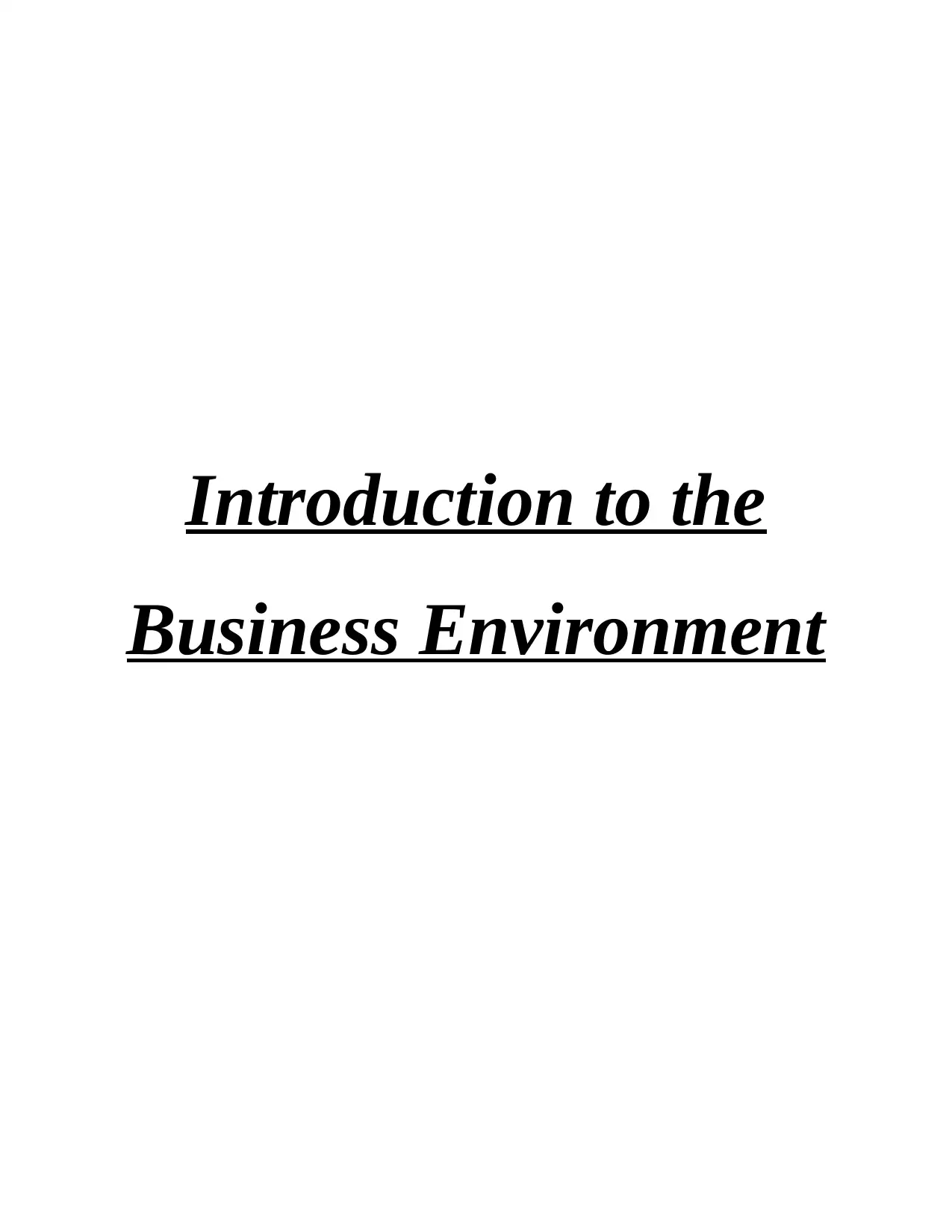
Introduction to the
Business Environment
Business Environment
Paraphrase This Document
Need a fresh take? Get an instant paraphrase of this document with our AI Paraphraser
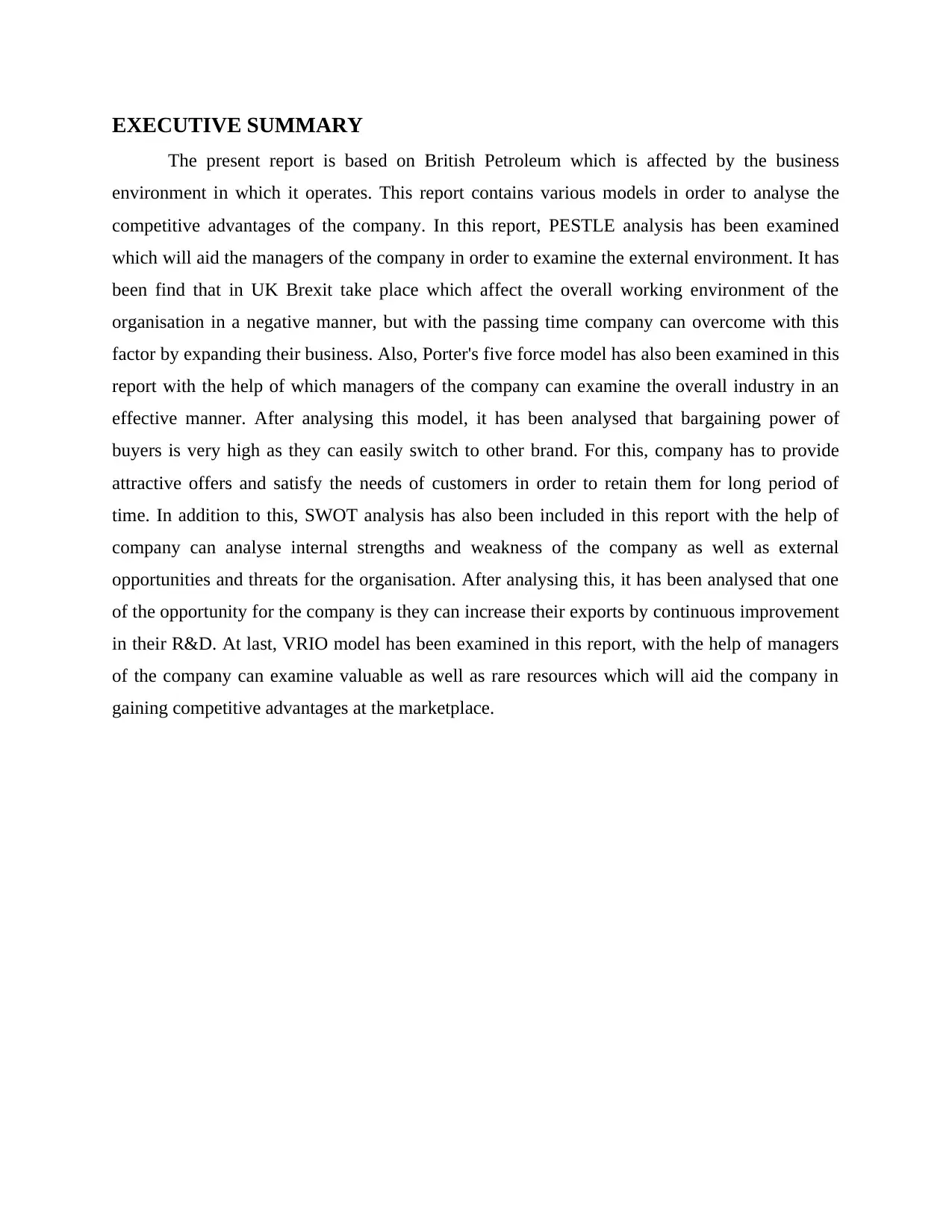
EXECUTIVE SUMMARY
The present report is based on British Petroleum which is affected by the business
environment in which it operates. This report contains various models in order to analyse the
competitive advantages of the company. In this report, PESTLE analysis has been examined
which will aid the managers of the company in order to examine the external environment. It has
been find that in UK Brexit take place which affect the overall working environment of the
organisation in a negative manner, but with the passing time company can overcome with this
factor by expanding their business. Also, Porter's five force model has also been examined in this
report with the help of which managers of the company can examine the overall industry in an
effective manner. After analysing this model, it has been analysed that bargaining power of
buyers is very high as they can easily switch to other brand. For this, company has to provide
attractive offers and satisfy the needs of customers in order to retain them for long period of
time. In addition to this, SWOT analysis has also been included in this report with the help of
company can analyse internal strengths and weakness of the company as well as external
opportunities and threats for the organisation. After analysing this, it has been analysed that one
of the opportunity for the company is they can increase their exports by continuous improvement
in their R&D. At last, VRIO model has been examined in this report, with the help of managers
of the company can examine valuable as well as rare resources which will aid the company in
gaining competitive advantages at the marketplace.
The present report is based on British Petroleum which is affected by the business
environment in which it operates. This report contains various models in order to analyse the
competitive advantages of the company. In this report, PESTLE analysis has been examined
which will aid the managers of the company in order to examine the external environment. It has
been find that in UK Brexit take place which affect the overall working environment of the
organisation in a negative manner, but with the passing time company can overcome with this
factor by expanding their business. Also, Porter's five force model has also been examined in this
report with the help of which managers of the company can examine the overall industry in an
effective manner. After analysing this model, it has been analysed that bargaining power of
buyers is very high as they can easily switch to other brand. For this, company has to provide
attractive offers and satisfy the needs of customers in order to retain them for long period of
time. In addition to this, SWOT analysis has also been included in this report with the help of
company can analyse internal strengths and weakness of the company as well as external
opportunities and threats for the organisation. After analysing this, it has been analysed that one
of the opportunity for the company is they can increase their exports by continuous improvement
in their R&D. At last, VRIO model has been examined in this report, with the help of managers
of the company can examine valuable as well as rare resources which will aid the company in
gaining competitive advantages at the marketplace.
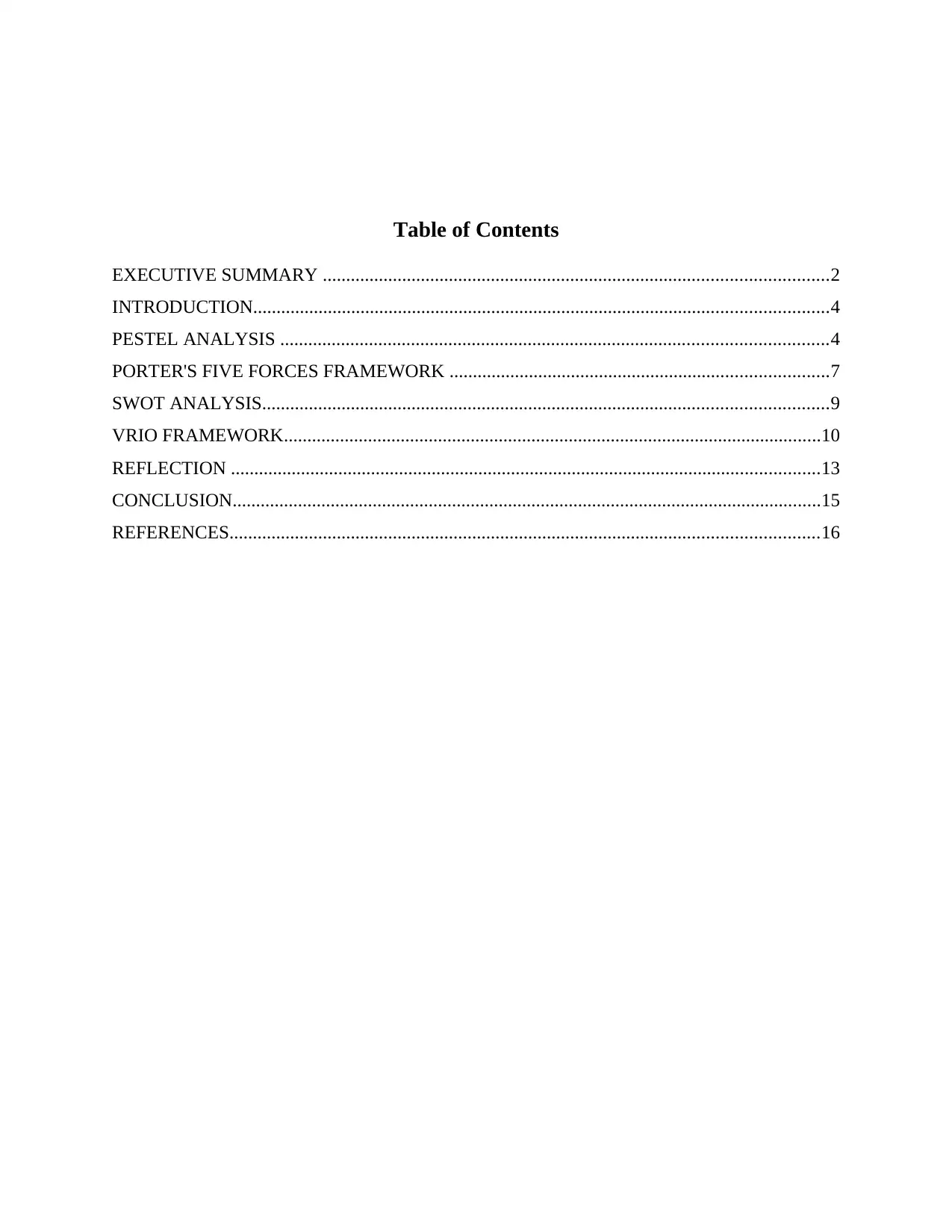
Table of Contents
EXECUTIVE SUMMARY ............................................................................................................2
INTRODUCTION...........................................................................................................................4
PESTEL ANALYSIS .....................................................................................................................4
PORTER'S FIVE FORCES FRAMEWORK .................................................................................7
SWOT ANALYSIS.........................................................................................................................9
VRIO FRAMEWORK...................................................................................................................10
REFLECTION ..............................................................................................................................13
CONCLUSION..............................................................................................................................15
REFERENCES..............................................................................................................................16
EXECUTIVE SUMMARY ............................................................................................................2
INTRODUCTION...........................................................................................................................4
PESTEL ANALYSIS .....................................................................................................................4
PORTER'S FIVE FORCES FRAMEWORK .................................................................................7
SWOT ANALYSIS.........................................................................................................................9
VRIO FRAMEWORK...................................................................................................................10
REFLECTION ..............................................................................................................................13
CONCLUSION..............................................................................................................................15
REFERENCES..............................................................................................................................16
⊘ This is a preview!⊘
Do you want full access?
Subscribe today to unlock all pages.

Trusted by 1+ million students worldwide
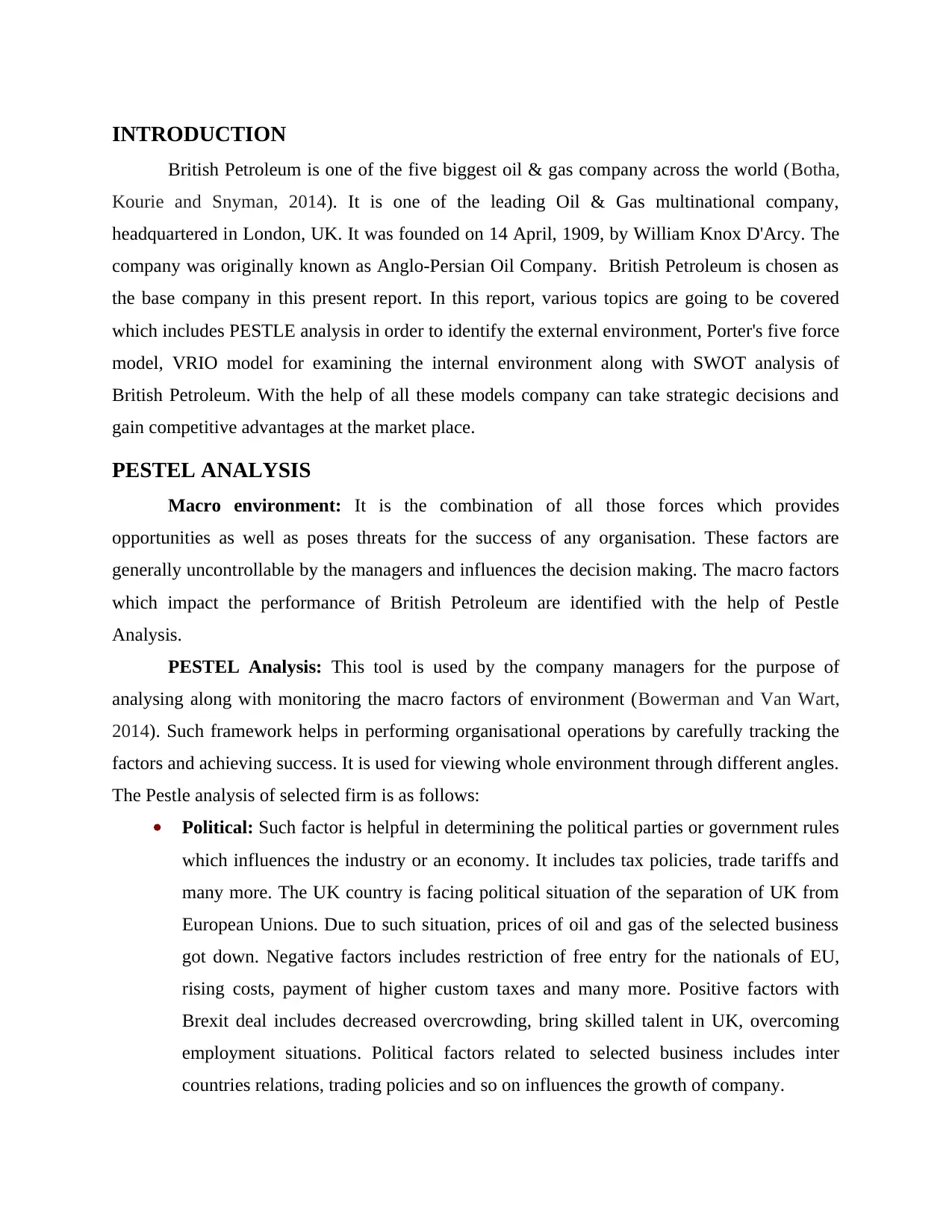
INTRODUCTION
British Petroleum is one of the five biggest oil & gas company across the world (Botha,
Kourie and Snyman, 2014). It is one of the leading Oil & Gas multinational company,
headquartered in London, UK. It was founded on 14 April, 1909, by William Knox D'Arcy. The
company was originally known as Anglo-Persian Oil Company. British Petroleum is chosen as
the base company in this present report. In this report, various topics are going to be covered
which includes PESTLE analysis in order to identify the external environment, Porter's five force
model, VRIO model for examining the internal environment along with SWOT analysis of
British Petroleum. With the help of all these models company can take strategic decisions and
gain competitive advantages at the market place.
PESTEL ANALYSIS
Macro environment: It is the combination of all those forces which provides
opportunities as well as poses threats for the success of any organisation. These factors are
generally uncontrollable by the managers and influences the decision making. The macro factors
which impact the performance of British Petroleum are identified with the help of Pestle
Analysis.
PESTEL Analysis: This tool is used by the company managers for the purpose of
analysing along with monitoring the macro factors of environment (Bowerman and Van Wart,
2014). Such framework helps in performing organisational operations by carefully tracking the
factors and achieving success. It is used for viewing whole environment through different angles.
The Pestle analysis of selected firm is as follows:
Political: Such factor is helpful in determining the political parties or government rules
which influences the industry or an economy. It includes tax policies, trade tariffs and
many more. The UK country is facing political situation of the separation of UK from
European Unions. Due to such situation, prices of oil and gas of the selected business
got down. Negative factors includes restriction of free entry for the nationals of EU,
rising costs, payment of higher custom taxes and many more. Positive factors with
Brexit deal includes decreased overcrowding, bring skilled talent in UK, overcoming
employment situations. Political factors related to selected business includes inter
countries relations, trading policies and so on influences the growth of company.
British Petroleum is one of the five biggest oil & gas company across the world (Botha,
Kourie and Snyman, 2014). It is one of the leading Oil & Gas multinational company,
headquartered in London, UK. It was founded on 14 April, 1909, by William Knox D'Arcy. The
company was originally known as Anglo-Persian Oil Company. British Petroleum is chosen as
the base company in this present report. In this report, various topics are going to be covered
which includes PESTLE analysis in order to identify the external environment, Porter's five force
model, VRIO model for examining the internal environment along with SWOT analysis of
British Petroleum. With the help of all these models company can take strategic decisions and
gain competitive advantages at the market place.
PESTEL ANALYSIS
Macro environment: It is the combination of all those forces which provides
opportunities as well as poses threats for the success of any organisation. These factors are
generally uncontrollable by the managers and influences the decision making. The macro factors
which impact the performance of British Petroleum are identified with the help of Pestle
Analysis.
PESTEL Analysis: This tool is used by the company managers for the purpose of
analysing along with monitoring the macro factors of environment (Bowerman and Van Wart,
2014). Such framework helps in performing organisational operations by carefully tracking the
factors and achieving success. It is used for viewing whole environment through different angles.
The Pestle analysis of selected firm is as follows:
Political: Such factor is helpful in determining the political parties or government rules
which influences the industry or an economy. It includes tax policies, trade tariffs and
many more. The UK country is facing political situation of the separation of UK from
European Unions. Due to such situation, prices of oil and gas of the selected business
got down. Negative factors includes restriction of free entry for the nationals of EU,
rising costs, payment of higher custom taxes and many more. Positive factors with
Brexit deal includes decreased overcrowding, bring skilled talent in UK, overcoming
employment situations. Political factors related to selected business includes inter
countries relations, trading policies and so on influences the growth of company.
Paraphrase This Document
Need a fresh take? Get an instant paraphrase of this document with our AI Paraphraser
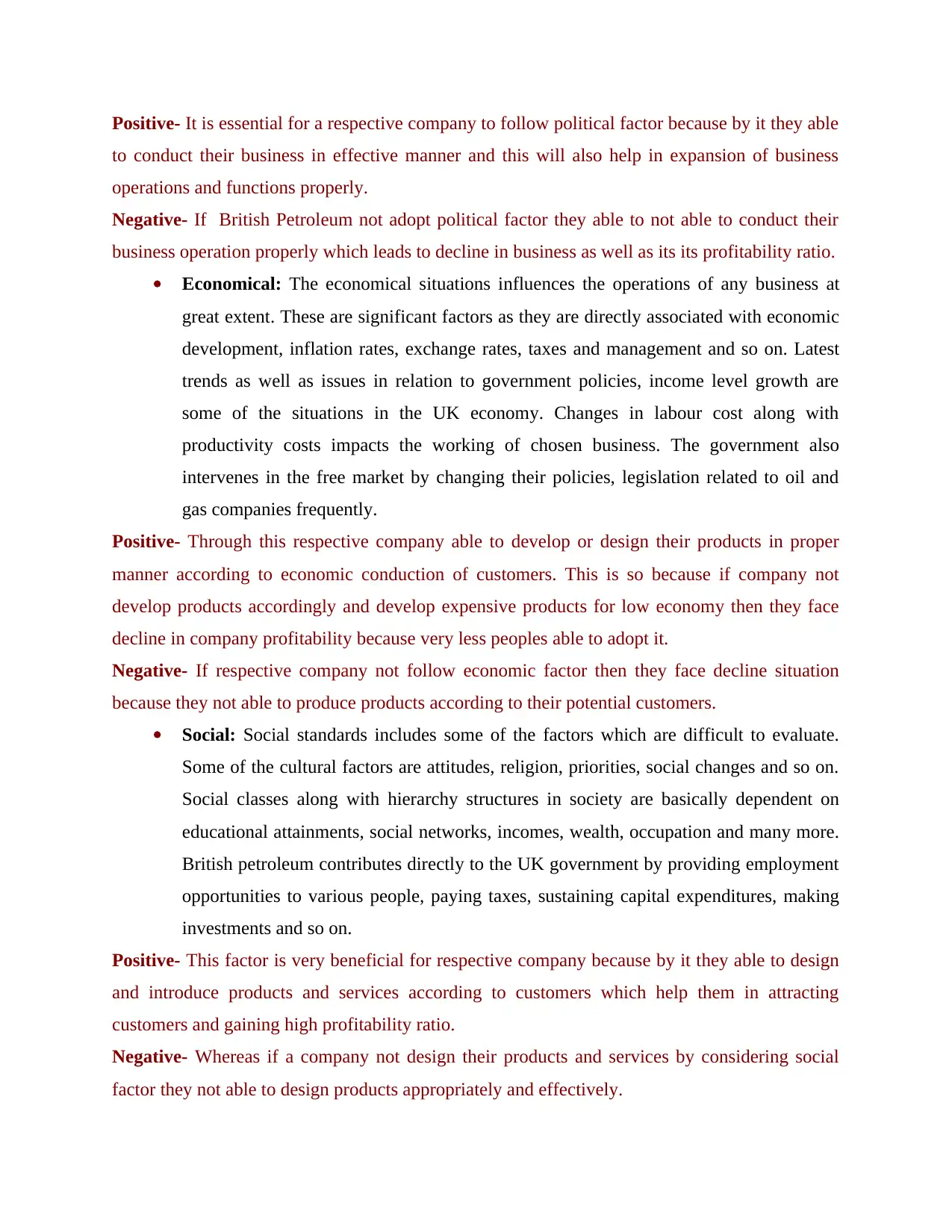
Positive- It is essential for a respective company to follow political factor because by it they able
to conduct their business in effective manner and this will also help in expansion of business
operations and functions properly.
Negative- If British Petroleum not adopt political factor they able to not able to conduct their
business operation properly which leads to decline in business as well as its its profitability ratio.
Economical: The economical situations influences the operations of any business at
great extent. These are significant factors as they are directly associated with economic
development, inflation rates, exchange rates, taxes and management and so on. Latest
trends as well as issues in relation to government policies, income level growth are
some of the situations in the UK economy. Changes in labour cost along with
productivity costs impacts the working of chosen business. The government also
intervenes in the free market by changing their policies, legislation related to oil and
gas companies frequently.
Positive- Through this respective company able to develop or design their products in proper
manner according to economic conduction of customers. This is so because if company not
develop products accordingly and develop expensive products for low economy then they face
decline in company profitability because very less peoples able to adopt it.
Negative- If respective company not follow economic factor then they face decline situation
because they not able to produce products according to their potential customers.
Social: Social standards includes some of the factors which are difficult to evaluate.
Some of the cultural factors are attitudes, religion, priorities, social changes and so on.
Social classes along with hierarchy structures in society are basically dependent on
educational attainments, social networks, incomes, wealth, occupation and many more.
British petroleum contributes directly to the UK government by providing employment
opportunities to various people, paying taxes, sustaining capital expenditures, making
investments and so on.
Positive- This factor is very beneficial for respective company because by it they able to design
and introduce products and services according to customers which help them in attracting
customers and gaining high profitability ratio.
Negative- Whereas if a company not design their products and services by considering social
factor they not able to design products appropriately and effectively.
to conduct their business in effective manner and this will also help in expansion of business
operations and functions properly.
Negative- If British Petroleum not adopt political factor they able to not able to conduct their
business operation properly which leads to decline in business as well as its its profitability ratio.
Economical: The economical situations influences the operations of any business at
great extent. These are significant factors as they are directly associated with economic
development, inflation rates, exchange rates, taxes and management and so on. Latest
trends as well as issues in relation to government policies, income level growth are
some of the situations in the UK economy. Changes in labour cost along with
productivity costs impacts the working of chosen business. The government also
intervenes in the free market by changing their policies, legislation related to oil and
gas companies frequently.
Positive- Through this respective company able to develop or design their products in proper
manner according to economic conduction of customers. This is so because if company not
develop products accordingly and develop expensive products for low economy then they face
decline in company profitability because very less peoples able to adopt it.
Negative- If respective company not follow economic factor then they face decline situation
because they not able to produce products according to their potential customers.
Social: Social standards includes some of the factors which are difficult to evaluate.
Some of the cultural factors are attitudes, religion, priorities, social changes and so on.
Social classes along with hierarchy structures in society are basically dependent on
educational attainments, social networks, incomes, wealth, occupation and many more.
British petroleum contributes directly to the UK government by providing employment
opportunities to various people, paying taxes, sustaining capital expenditures, making
investments and so on.
Positive- This factor is very beneficial for respective company because by it they able to design
and introduce products and services according to customers which help them in attracting
customers and gaining high profitability ratio.
Negative- Whereas if a company not design their products and services by considering social
factor they not able to design products appropriately and effectively.
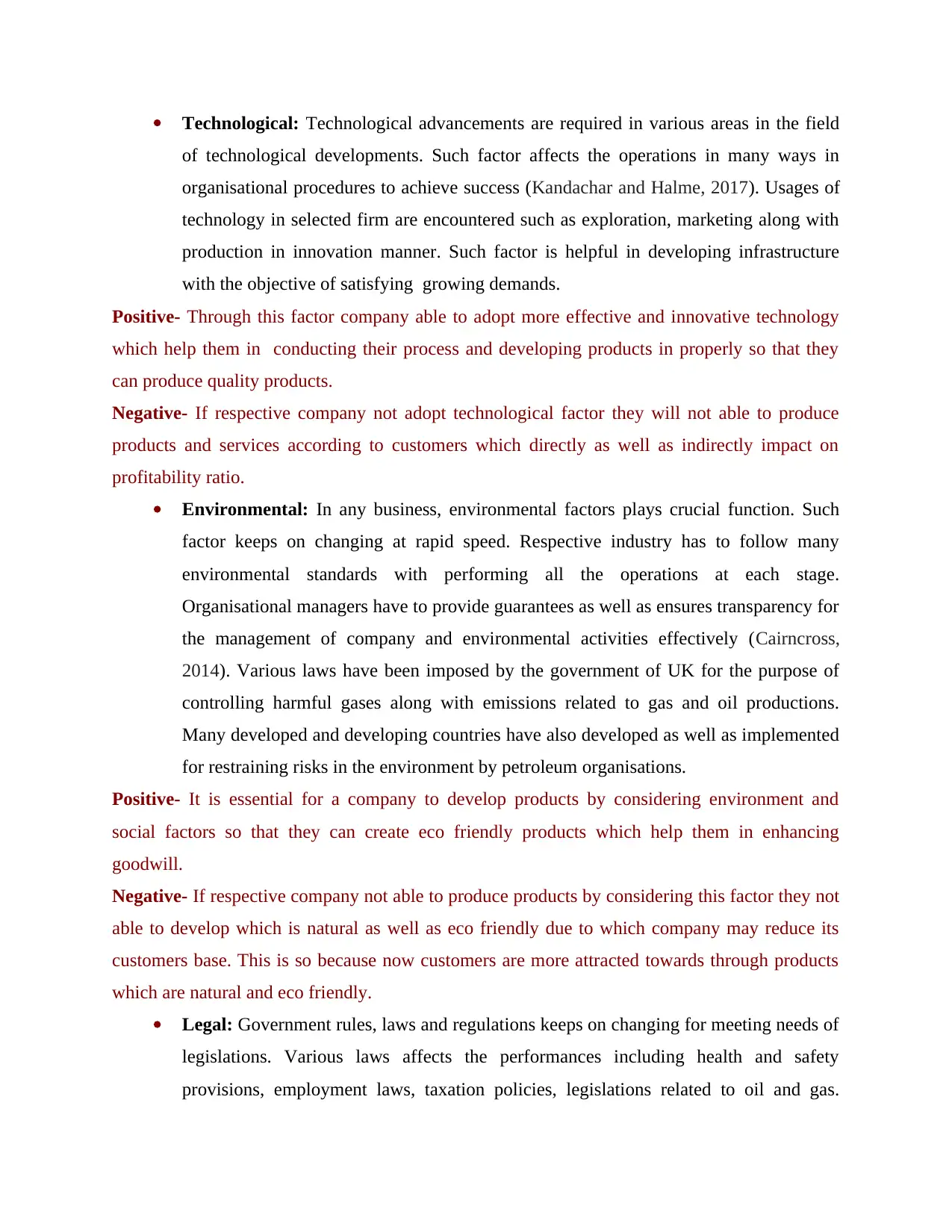
Technological: Technological advancements are required in various areas in the field
of technological developments. Such factor affects the operations in many ways in
organisational procedures to achieve success (Kandachar and Halme, 2017). Usages of
technology in selected firm are encountered such as exploration, marketing along with
production in innovation manner. Such factor is helpful in developing infrastructure
with the objective of satisfying growing demands.
Positive- Through this factor company able to adopt more effective and innovative technology
which help them in conducting their process and developing products in properly so that they
can produce quality products.
Negative- If respective company not adopt technological factor they will not able to produce
products and services according to customers which directly as well as indirectly impact on
profitability ratio.
Environmental: In any business, environmental factors plays crucial function. Such
factor keeps on changing at rapid speed. Respective industry has to follow many
environmental standards with performing all the operations at each stage.
Organisational managers have to provide guarantees as well as ensures transparency for
the management of company and environmental activities effectively (Cairncross,
2014). Various laws have been imposed by the government of UK for the purpose of
controlling harmful gases along with emissions related to gas and oil productions.
Many developed and developing countries have also developed as well as implemented
for restraining risks in the environment by petroleum organisations.
Positive- It is essential for a company to develop products by considering environment and
social factors so that they can create eco friendly products which help them in enhancing
goodwill.
Negative- If respective company not able to produce products by considering this factor they not
able to develop which is natural as well as eco friendly due to which company may reduce its
customers base. This is so because now customers are more attracted towards through products
which are natural and eco friendly.
Legal: Government rules, laws and regulations keeps on changing for meeting needs of
legislations. Various laws affects the performances including health and safety
provisions, employment laws, taxation policies, legislations related to oil and gas.
of technological developments. Such factor affects the operations in many ways in
organisational procedures to achieve success (Kandachar and Halme, 2017). Usages of
technology in selected firm are encountered such as exploration, marketing along with
production in innovation manner. Such factor is helpful in developing infrastructure
with the objective of satisfying growing demands.
Positive- Through this factor company able to adopt more effective and innovative technology
which help them in conducting their process and developing products in properly so that they
can produce quality products.
Negative- If respective company not adopt technological factor they will not able to produce
products and services according to customers which directly as well as indirectly impact on
profitability ratio.
Environmental: In any business, environmental factors plays crucial function. Such
factor keeps on changing at rapid speed. Respective industry has to follow many
environmental standards with performing all the operations at each stage.
Organisational managers have to provide guarantees as well as ensures transparency for
the management of company and environmental activities effectively (Cairncross,
2014). Various laws have been imposed by the government of UK for the purpose of
controlling harmful gases along with emissions related to gas and oil productions.
Many developed and developing countries have also developed as well as implemented
for restraining risks in the environment by petroleum organisations.
Positive- It is essential for a company to develop products by considering environment and
social factors so that they can create eco friendly products which help them in enhancing
goodwill.
Negative- If respective company not able to produce products by considering this factor they not
able to develop which is natural as well as eco friendly due to which company may reduce its
customers base. This is so because now customers are more attracted towards through products
which are natural and eco friendly.
Legal: Government rules, laws and regulations keeps on changing for meeting needs of
legislations. Various laws affects the performances including health and safety
provisions, employment laws, taxation policies, legislations related to oil and gas.
⊘ This is a preview!⊘
Do you want full access?
Subscribe today to unlock all pages.

Trusted by 1+ million students worldwide
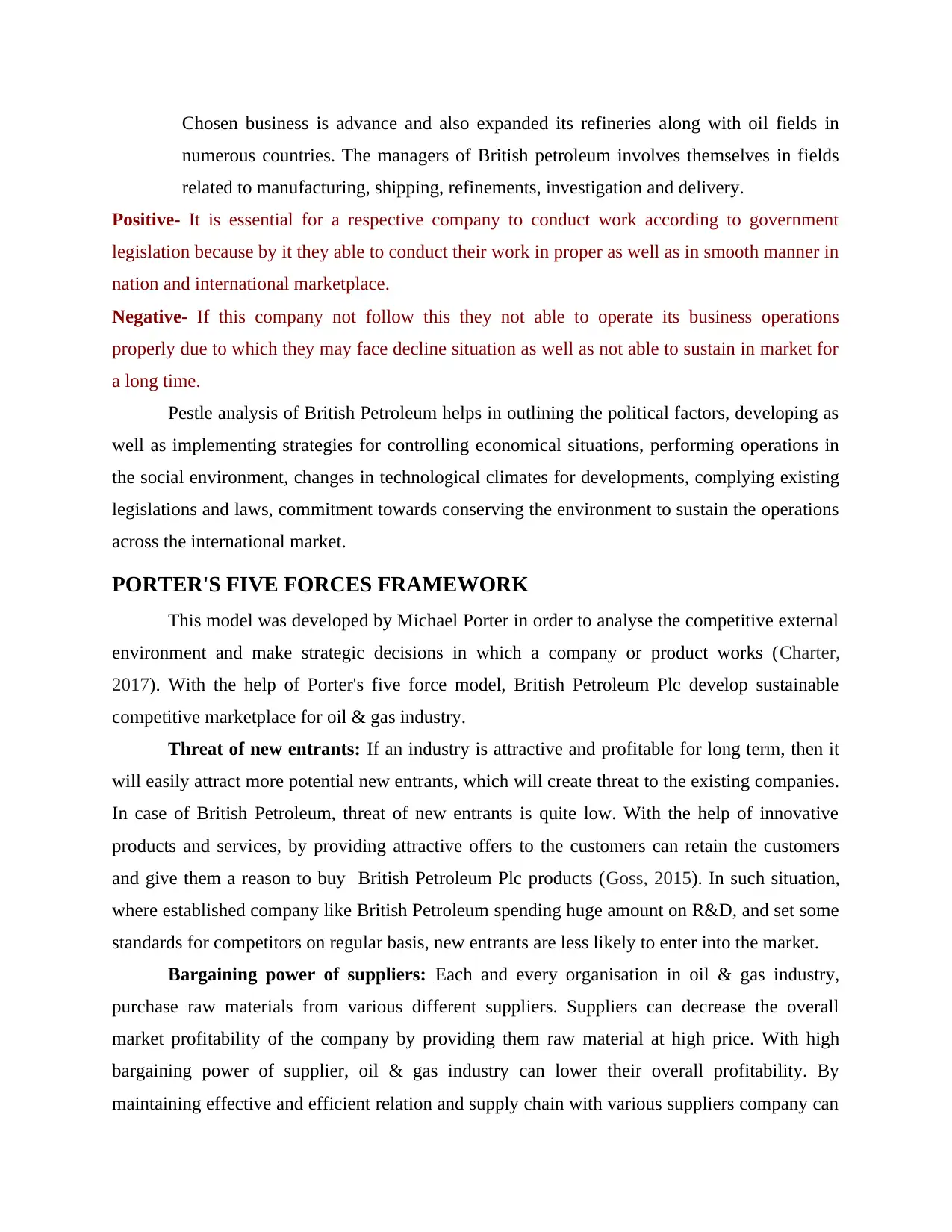
Chosen business is advance and also expanded its refineries along with oil fields in
numerous countries. The managers of British petroleum involves themselves in fields
related to manufacturing, shipping, refinements, investigation and delivery.
Positive- It is essential for a respective company to conduct work according to government
legislation because by it they able to conduct their work in proper as well as in smooth manner in
nation and international marketplace.
Negative- If this company not follow this they not able to operate its business operations
properly due to which they may face decline situation as well as not able to sustain in market for
a long time.
Pestle analysis of British Petroleum helps in outlining the political factors, developing as
well as implementing strategies for controlling economical situations, performing operations in
the social environment, changes in technological climates for developments, complying existing
legislations and laws, commitment towards conserving the environment to sustain the operations
across the international market.
PORTER'S FIVE FORCES FRAMEWORK
This model was developed by Michael Porter in order to analyse the competitive external
environment and make strategic decisions in which a company or product works (Charter,
2017). With the help of Porter's five force model, British Petroleum Plc develop sustainable
competitive marketplace for oil & gas industry.
Threat of new entrants: If an industry is attractive and profitable for long term, then it
will easily attract more potential new entrants, which will create threat to the existing companies.
In case of British Petroleum, threat of new entrants is quite low. With the help of innovative
products and services, by providing attractive offers to the customers can retain the customers
and give them a reason to buy British Petroleum Plc products (Goss, 2015). In such situation,
where established company like British Petroleum spending huge amount on R&D, and set some
standards for competitors on regular basis, new entrants are less likely to enter into the market.
Bargaining power of suppliers: Each and every organisation in oil & gas industry,
purchase raw materials from various different suppliers. Suppliers can decrease the overall
market profitability of the company by providing them raw material at high price. With high
bargaining power of supplier, oil & gas industry can lower their overall profitability. By
maintaining effective and efficient relation and supply chain with various suppliers company can
numerous countries. The managers of British petroleum involves themselves in fields
related to manufacturing, shipping, refinements, investigation and delivery.
Positive- It is essential for a respective company to conduct work according to government
legislation because by it they able to conduct their work in proper as well as in smooth manner in
nation and international marketplace.
Negative- If this company not follow this they not able to operate its business operations
properly due to which they may face decline situation as well as not able to sustain in market for
a long time.
Pestle analysis of British Petroleum helps in outlining the political factors, developing as
well as implementing strategies for controlling economical situations, performing operations in
the social environment, changes in technological climates for developments, complying existing
legislations and laws, commitment towards conserving the environment to sustain the operations
across the international market.
PORTER'S FIVE FORCES FRAMEWORK
This model was developed by Michael Porter in order to analyse the competitive external
environment and make strategic decisions in which a company or product works (Charter,
2017). With the help of Porter's five force model, British Petroleum Plc develop sustainable
competitive marketplace for oil & gas industry.
Threat of new entrants: If an industry is attractive and profitable for long term, then it
will easily attract more potential new entrants, which will create threat to the existing companies.
In case of British Petroleum, threat of new entrants is quite low. With the help of innovative
products and services, by providing attractive offers to the customers can retain the customers
and give them a reason to buy British Petroleum Plc products (Goss, 2015). In such situation,
where established company like British Petroleum spending huge amount on R&D, and set some
standards for competitors on regular basis, new entrants are less likely to enter into the market.
Bargaining power of suppliers: Each and every organisation in oil & gas industry,
purchase raw materials from various different suppliers. Suppliers can decrease the overall
market profitability of the company by providing them raw material at high price. With high
bargaining power of supplier, oil & gas industry can lower their overall profitability. By
maintaining effective and efficient relation and supply chain with various suppliers company can
Paraphrase This Document
Need a fresh take? Get an instant paraphrase of this document with our AI Paraphraser
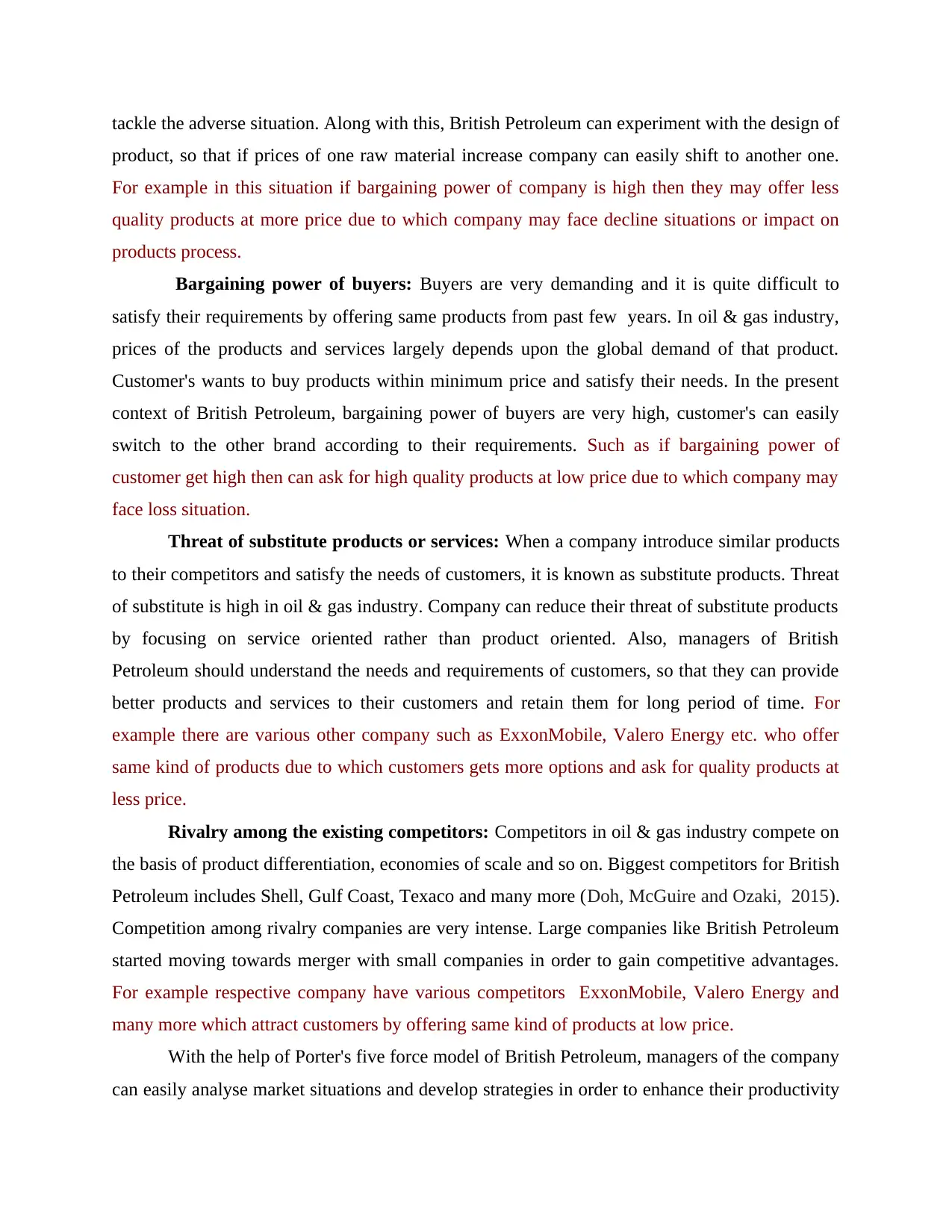
tackle the adverse situation. Along with this, British Petroleum can experiment with the design of
product, so that if prices of one raw material increase company can easily shift to another one.
For example in this situation if bargaining power of company is high then they may offer less
quality products at more price due to which company may face decline situations or impact on
products process.
Bargaining power of buyers: Buyers are very demanding and it is quite difficult to
satisfy their requirements by offering same products from past few years. In oil & gas industry,
prices of the products and services largely depends upon the global demand of that product.
Customer's wants to buy products within minimum price and satisfy their needs. In the present
context of British Petroleum, bargaining power of buyers are very high, customer's can easily
switch to the other brand according to their requirements. Such as if bargaining power of
customer get high then can ask for high quality products at low price due to which company may
face loss situation.
Threat of substitute products or services: When a company introduce similar products
to their competitors and satisfy the needs of customers, it is known as substitute products. Threat
of substitute is high in oil & gas industry. Company can reduce their threat of substitute products
by focusing on service oriented rather than product oriented. Also, managers of British
Petroleum should understand the needs and requirements of customers, so that they can provide
better products and services to their customers and retain them for long period of time. For
example there are various other company such as ExxonMobile, Valero Energy etc. who offer
same kind of products due to which customers gets more options and ask for quality products at
less price.
Rivalry among the existing competitors: Competitors in oil & gas industry compete on
the basis of product differentiation, economies of scale and so on. Biggest competitors for British
Petroleum includes Shell, Gulf Coast, Texaco and many more (Doh, McGuire and Ozaki, 2015).
Competition among rivalry companies are very intense. Large companies like British Petroleum
started moving towards merger with small companies in order to gain competitive advantages.
For example respective company have various competitors ExxonMobile, Valero Energy and
many more which attract customers by offering same kind of products at low price.
With the help of Porter's five force model of British Petroleum, managers of the company
can easily analyse market situations and develop strategies in order to enhance their productivity
product, so that if prices of one raw material increase company can easily shift to another one.
For example in this situation if bargaining power of company is high then they may offer less
quality products at more price due to which company may face decline situations or impact on
products process.
Bargaining power of buyers: Buyers are very demanding and it is quite difficult to
satisfy their requirements by offering same products from past few years. In oil & gas industry,
prices of the products and services largely depends upon the global demand of that product.
Customer's wants to buy products within minimum price and satisfy their needs. In the present
context of British Petroleum, bargaining power of buyers are very high, customer's can easily
switch to the other brand according to their requirements. Such as if bargaining power of
customer get high then can ask for high quality products at low price due to which company may
face loss situation.
Threat of substitute products or services: When a company introduce similar products
to their competitors and satisfy the needs of customers, it is known as substitute products. Threat
of substitute is high in oil & gas industry. Company can reduce their threat of substitute products
by focusing on service oriented rather than product oriented. Also, managers of British
Petroleum should understand the needs and requirements of customers, so that they can provide
better products and services to their customers and retain them for long period of time. For
example there are various other company such as ExxonMobile, Valero Energy etc. who offer
same kind of products due to which customers gets more options and ask for quality products at
less price.
Rivalry among the existing competitors: Competitors in oil & gas industry compete on
the basis of product differentiation, economies of scale and so on. Biggest competitors for British
Petroleum includes Shell, Gulf Coast, Texaco and many more (Doh, McGuire and Ozaki, 2015).
Competition among rivalry companies are very intense. Large companies like British Petroleum
started moving towards merger with small companies in order to gain competitive advantages.
For example respective company have various competitors ExxonMobile, Valero Energy and
many more which attract customers by offering same kind of products at low price.
With the help of Porter's five force model of British Petroleum, managers of the company
can easily analyse market situations and develop strategies in order to enhance their productivity
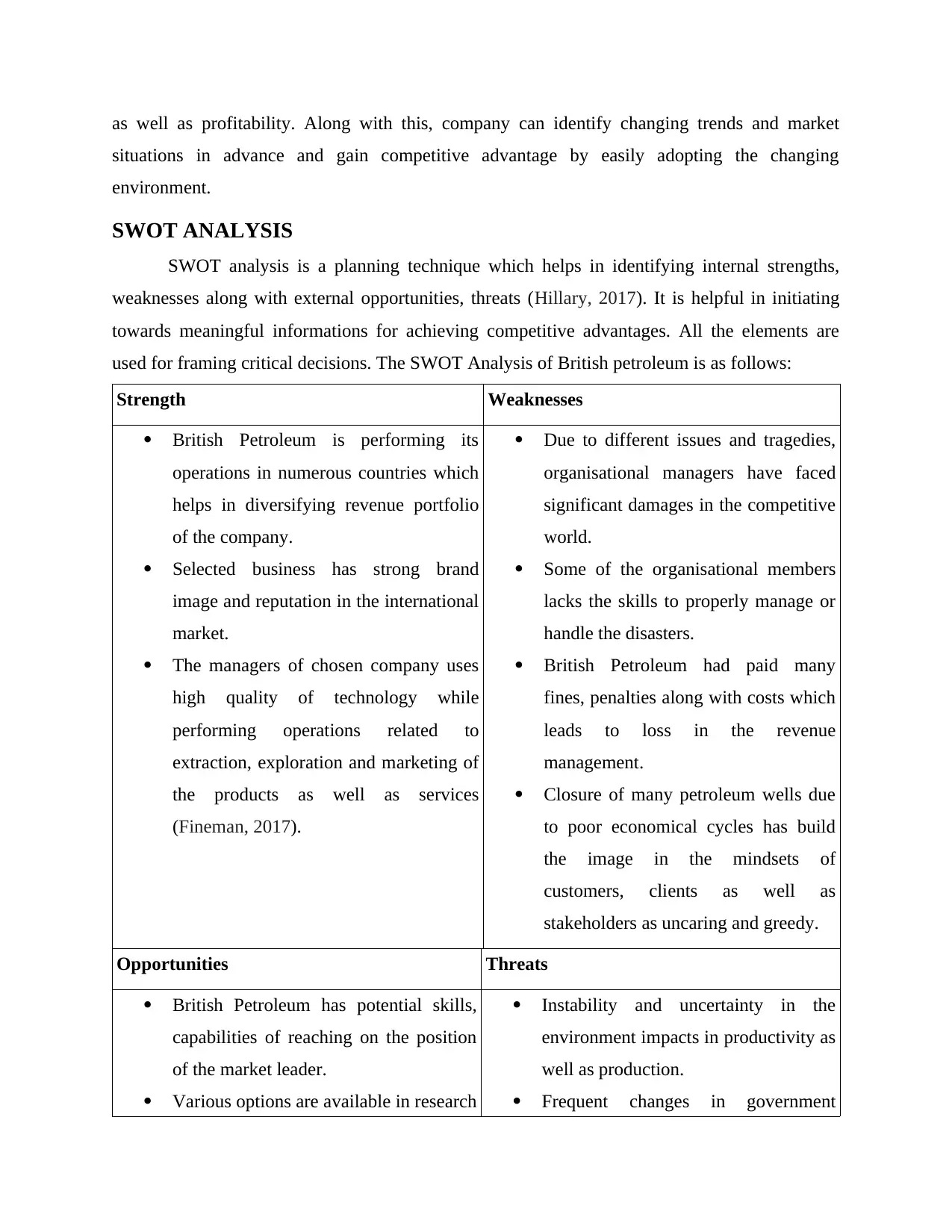
as well as profitability. Along with this, company can identify changing trends and market
situations in advance and gain competitive advantage by easily adopting the changing
environment.
SWOT ANALYSIS
SWOT analysis is a planning technique which helps in identifying internal strengths,
weaknesses along with external opportunities, threats (Hillary, 2017). It is helpful in initiating
towards meaningful informations for achieving competitive advantages. All the elements are
used for framing critical decisions. The SWOT Analysis of British petroleum is as follows:
Strength Weaknesses
British Petroleum is performing its
operations in numerous countries which
helps in diversifying revenue portfolio
of the company.
Selected business has strong brand
image and reputation in the international
market.
The managers of chosen company uses
high quality of technology while
performing operations related to
extraction, exploration and marketing of
the products as well as services
(Fineman, 2017).
Due to different issues and tragedies,
organisational managers have faced
significant damages in the competitive
world.
Some of the organisational members
lacks the skills to properly manage or
handle the disasters.
British Petroleum had paid many
fines, penalties along with costs which
leads to loss in the revenue
management.
Closure of many petroleum wells due
to poor economical cycles has build
the image in the mindsets of
customers, clients as well as
stakeholders as uncaring and greedy.
Opportunities Threats
British Petroleum has potential skills,
capabilities of reaching on the position
of the market leader.
Various options are available in research
Instability and uncertainty in the
environment impacts in productivity as
well as production.
Frequent changes in government
situations in advance and gain competitive advantage by easily adopting the changing
environment.
SWOT ANALYSIS
SWOT analysis is a planning technique which helps in identifying internal strengths,
weaknesses along with external opportunities, threats (Hillary, 2017). It is helpful in initiating
towards meaningful informations for achieving competitive advantages. All the elements are
used for framing critical decisions. The SWOT Analysis of British petroleum is as follows:
Strength Weaknesses
British Petroleum is performing its
operations in numerous countries which
helps in diversifying revenue portfolio
of the company.
Selected business has strong brand
image and reputation in the international
market.
The managers of chosen company uses
high quality of technology while
performing operations related to
extraction, exploration and marketing of
the products as well as services
(Fineman, 2017).
Due to different issues and tragedies,
organisational managers have faced
significant damages in the competitive
world.
Some of the organisational members
lacks the skills to properly manage or
handle the disasters.
British Petroleum had paid many
fines, penalties along with costs which
leads to loss in the revenue
management.
Closure of many petroleum wells due
to poor economical cycles has build
the image in the mindsets of
customers, clients as well as
stakeholders as uncaring and greedy.
Opportunities Threats
British Petroleum has potential skills,
capabilities of reaching on the position
of the market leader.
Various options are available in research
Instability and uncertainty in the
environment impacts in productivity as
well as production.
Frequent changes in government
⊘ This is a preview!⊘
Do you want full access?
Subscribe today to unlock all pages.

Trusted by 1+ million students worldwide
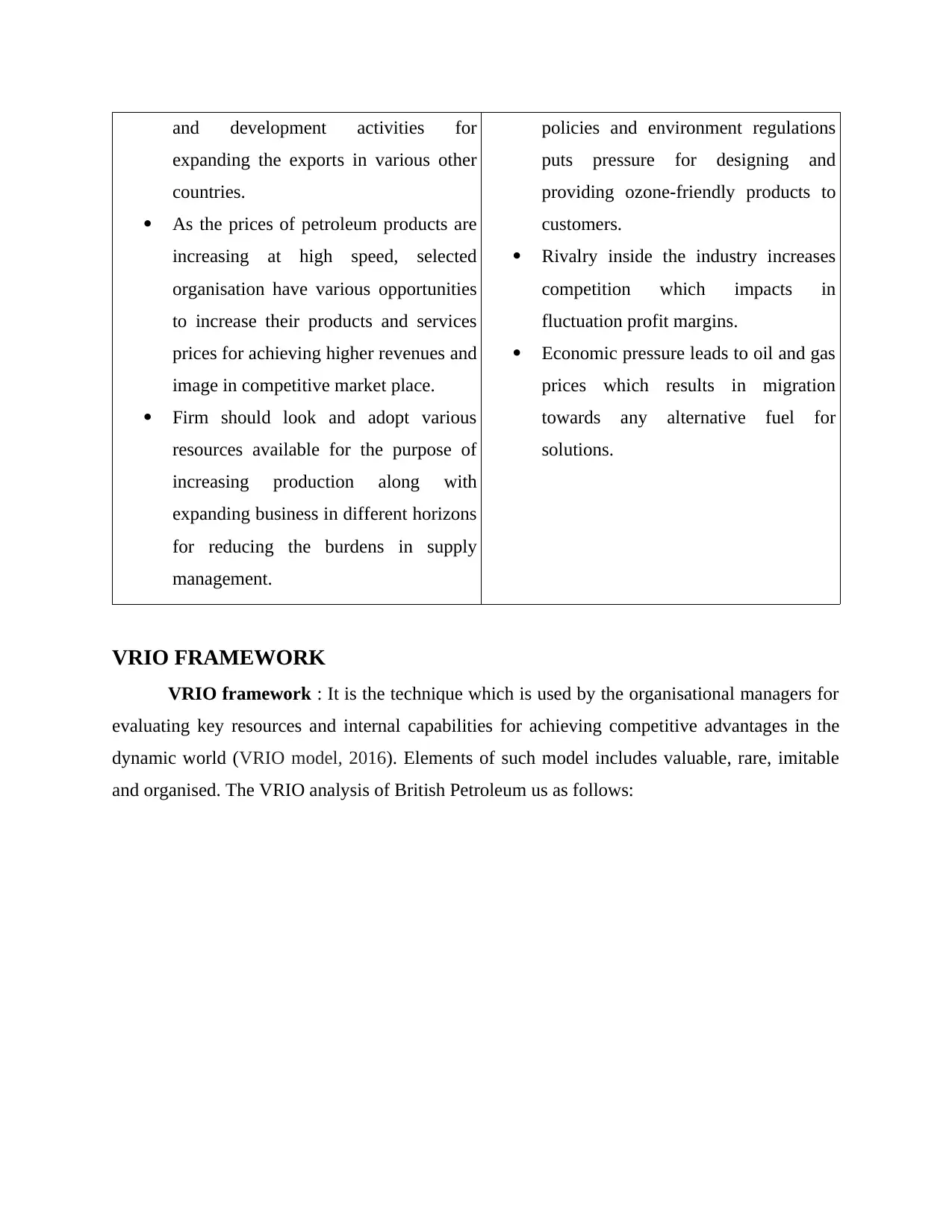
and development activities for
expanding the exports in various other
countries.
As the prices of petroleum products are
increasing at high speed, selected
organisation have various opportunities
to increase their products and services
prices for achieving higher revenues and
image in competitive market place.
Firm should look and adopt various
resources available for the purpose of
increasing production along with
expanding business in different horizons
for reducing the burdens in supply
management.
policies and environment regulations
puts pressure for designing and
providing ozone-friendly products to
customers.
Rivalry inside the industry increases
competition which impacts in
fluctuation profit margins.
Economic pressure leads to oil and gas
prices which results in migration
towards any alternative fuel for
solutions.
VRIO FRAMEWORK
VRIO framework : It is the technique which is used by the organisational managers for
evaluating key resources and internal capabilities for achieving competitive advantages in the
dynamic world (VRIO model, 2016). Elements of such model includes valuable, rare, imitable
and organised. The VRIO analysis of British Petroleum us as follows:
expanding the exports in various other
countries.
As the prices of petroleum products are
increasing at high speed, selected
organisation have various opportunities
to increase their products and services
prices for achieving higher revenues and
image in competitive market place.
Firm should look and adopt various
resources available for the purpose of
increasing production along with
expanding business in different horizons
for reducing the burdens in supply
management.
policies and environment regulations
puts pressure for designing and
providing ozone-friendly products to
customers.
Rivalry inside the industry increases
competition which impacts in
fluctuation profit margins.
Economic pressure leads to oil and gas
prices which results in migration
towards any alternative fuel for
solutions.
VRIO FRAMEWORK
VRIO framework : It is the technique which is used by the organisational managers for
evaluating key resources and internal capabilities for achieving competitive advantages in the
dynamic world (VRIO model, 2016). Elements of such model includes valuable, rare, imitable
and organised. The VRIO analysis of British Petroleum us as follows:
Paraphrase This Document
Need a fresh take? Get an instant paraphrase of this document with our AI Paraphraser
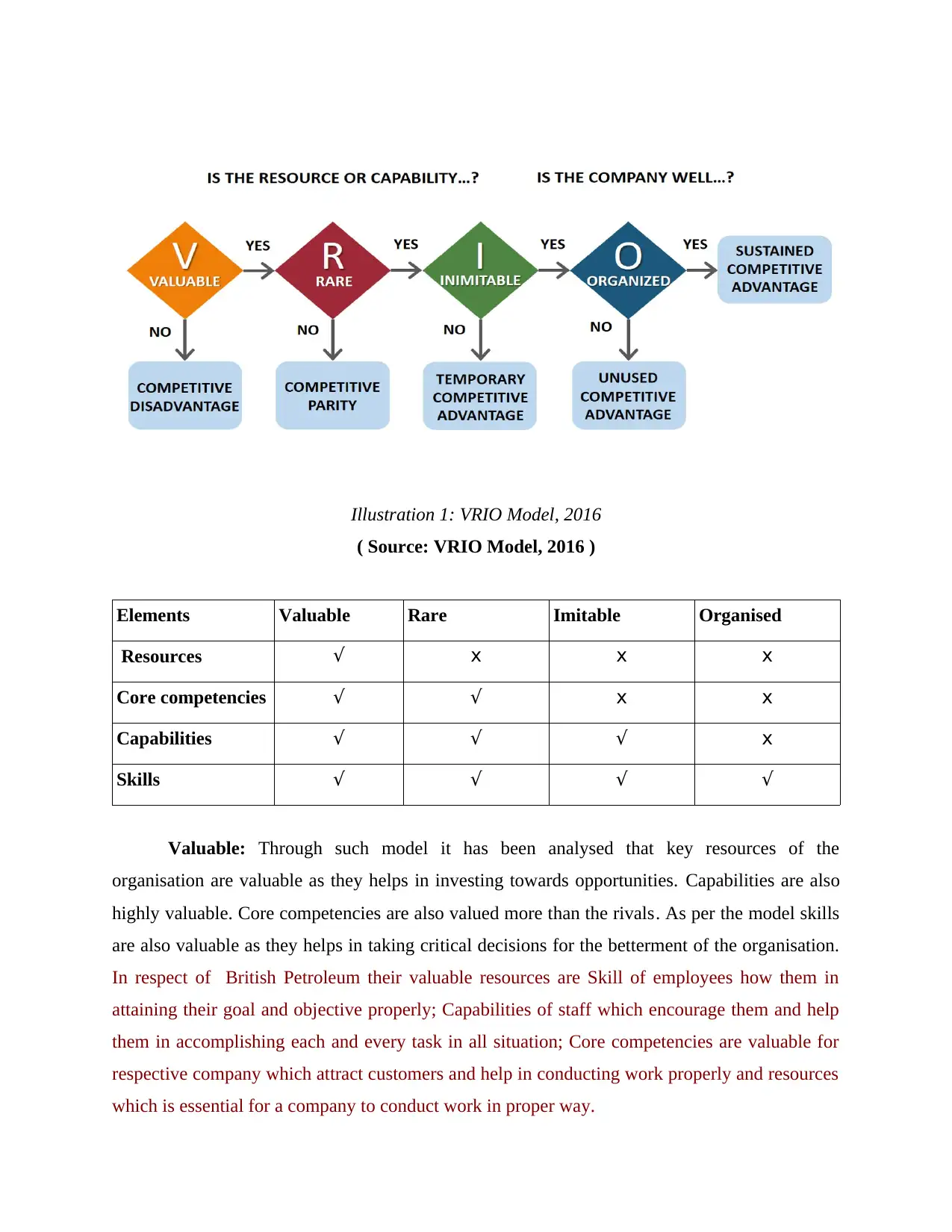
Illustration 1: VRIO Model, 2016
( Source: VRIO Model, 2016 )
Elements Valuable Rare Imitable Organised
Resources √ х х х
Core competencies √ √ х х
Capabilities √ √ √ х
Skills √ √ √ √
Valuable: Through such model it has been analysed that key resources of the
organisation are valuable as they helps in investing towards opportunities. Capabilities are also
highly valuable. Core competencies are also valued more than the rivals. As per the model skills
are also valuable as they helps in taking critical decisions for the betterment of the organisation.
In respect of British Petroleum their valuable resources are Skill of employees how them in
attaining their goal and objective properly; Capabilities of staff which encourage them and help
them in accomplishing each and every task in all situation; Core competencies are valuable for
respective company which attract customers and help in conducting work properly and resources
which is essential for a company to conduct work in proper way.
( Source: VRIO Model, 2016 )
Elements Valuable Rare Imitable Organised
Resources √ х х х
Core competencies √ √ х х
Capabilities √ √ √ х
Skills √ √ √ √
Valuable: Through such model it has been analysed that key resources of the
organisation are valuable as they helps in investing towards opportunities. Capabilities are also
highly valuable. Core competencies are also valued more than the rivals. As per the model skills
are also valuable as they helps in taking critical decisions for the betterment of the organisation.
In respect of British Petroleum their valuable resources are Skill of employees how them in
attaining their goal and objective properly; Capabilities of staff which encourage them and help
them in accomplishing each and every task in all situation; Core competencies are valuable for
respective company which attract customers and help in conducting work properly and resources
which is essential for a company to conduct work in proper way.
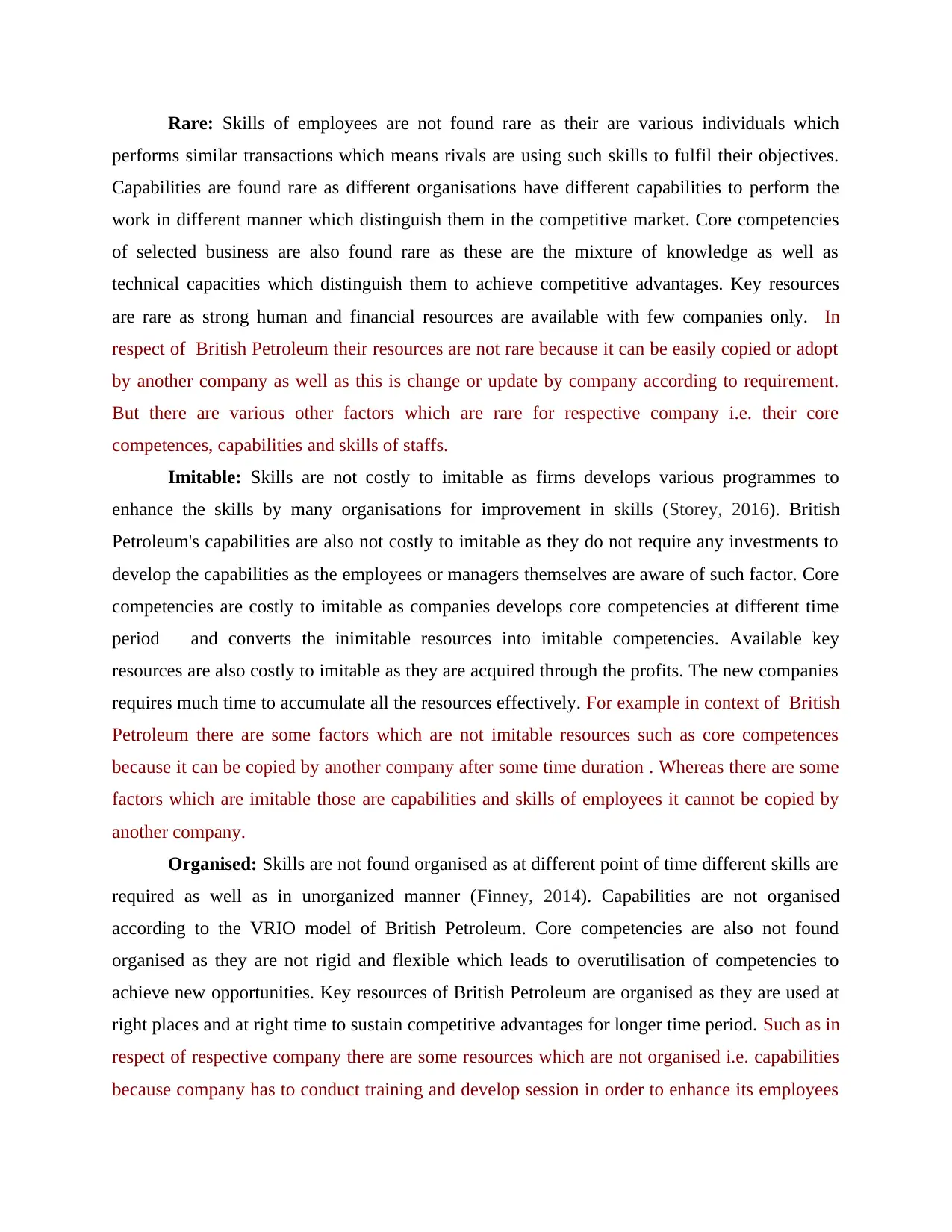
Rare: Skills of employees are not found rare as their are various individuals which
performs similar transactions which means rivals are using such skills to fulfil their objectives.
Capabilities are found rare as different organisations have different capabilities to perform the
work in different manner which distinguish them in the competitive market. Core competencies
of selected business are also found rare as these are the mixture of knowledge as well as
technical capacities which distinguish them to achieve competitive advantages. Key resources
are rare as strong human and financial resources are available with few companies only. In
respect of British Petroleum their resources are not rare because it can be easily copied or adopt
by another company as well as this is change or update by company according to requirement.
But there are various other factors which are rare for respective company i.e. their core
competences, capabilities and skills of staffs.
Imitable: Skills are not costly to imitable as firms develops various programmes to
enhance the skills by many organisations for improvement in skills (Storey, 2016). British
Petroleum's capabilities are also not costly to imitable as they do not require any investments to
develop the capabilities as the employees or managers themselves are aware of such factor. Core
competencies are costly to imitable as companies develops core competencies at different time
period and converts the inimitable resources into imitable competencies. Available key
resources are also costly to imitable as they are acquired through the profits. The new companies
requires much time to accumulate all the resources effectively. For example in context of British
Petroleum there are some factors which are not imitable resources such as core competences
because it can be copied by another company after some time duration . Whereas there are some
factors which are imitable those are capabilities and skills of employees it cannot be copied by
another company.
Organised: Skills are not found organised as at different point of time different skills are
required as well as in unorganized manner (Finney, 2014). Capabilities are not organised
according to the VRIO model of British Petroleum. Core competencies are also not found
organised as they are not rigid and flexible which leads to overutilisation of competencies to
achieve new opportunities. Key resources of British Petroleum are organised as they are used at
right places and at right time to sustain competitive advantages for longer time period. Such as in
respect of respective company there are some resources which are not organised i.e. capabilities
because company has to conduct training and develop session in order to enhance its employees
performs similar transactions which means rivals are using such skills to fulfil their objectives.
Capabilities are found rare as different organisations have different capabilities to perform the
work in different manner which distinguish them in the competitive market. Core competencies
of selected business are also found rare as these are the mixture of knowledge as well as
technical capacities which distinguish them to achieve competitive advantages. Key resources
are rare as strong human and financial resources are available with few companies only. In
respect of British Petroleum their resources are not rare because it can be easily copied or adopt
by another company as well as this is change or update by company according to requirement.
But there are various other factors which are rare for respective company i.e. their core
competences, capabilities and skills of staffs.
Imitable: Skills are not costly to imitable as firms develops various programmes to
enhance the skills by many organisations for improvement in skills (Storey, 2016). British
Petroleum's capabilities are also not costly to imitable as they do not require any investments to
develop the capabilities as the employees or managers themselves are aware of such factor. Core
competencies are costly to imitable as companies develops core competencies at different time
period and converts the inimitable resources into imitable competencies. Available key
resources are also costly to imitable as they are acquired through the profits. The new companies
requires much time to accumulate all the resources effectively. For example in context of British
Petroleum there are some factors which are not imitable resources such as core competences
because it can be copied by another company after some time duration . Whereas there are some
factors which are imitable those are capabilities and skills of employees it cannot be copied by
another company.
Organised: Skills are not found organised as at different point of time different skills are
required as well as in unorganized manner (Finney, 2014). Capabilities are not organised
according to the VRIO model of British Petroleum. Core competencies are also not found
organised as they are not rigid and flexible which leads to overutilisation of competencies to
achieve new opportunities. Key resources of British Petroleum are organised as they are used at
right places and at right time to sustain competitive advantages for longer time period. Such as in
respect of respective company there are some resources which are not organised i.e. capabilities
because company has to conduct training and develop session in order to enhance its employees
⊘ This is a preview!⊘
Do you want full access?
Subscribe today to unlock all pages.

Trusted by 1+ million students worldwide
1 out of 16
Related Documents
Your All-in-One AI-Powered Toolkit for Academic Success.
+13062052269
info@desklib.com
Available 24*7 on WhatsApp / Email
![[object Object]](/_next/static/media/star-bottom.7253800d.svg)
Unlock your academic potential
Copyright © 2020–2026 A2Z Services. All Rights Reserved. Developed and managed by ZUCOL.





